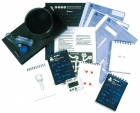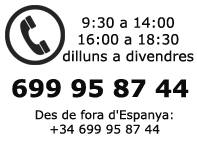- PER TIPUS DE JOGUINA
- Jocs d'estratègia
- Jocs d'exterior
- Jocs d'ordinador
- Jocs de dòmino
- Jocs familiars i cooperatius
- Jocs per a gent gran
- Joguines científics
- Joguines d'adquisició de coneixements
- Joguines d'estimulació intel·lectual i memòria
- Joguines de bany
- Joguines de construcció
- Joguines de representació
- Joguines motrius
- Joguines simbòlic
- Manualitats
- Ninos i complements
- Primeres joguines
- Puzles / Trencaclosques
- JOGUINES PER EDAT
REGISTRE
BADS, Behavioural Assessment of the Dysexecutive Syndrome
Barbara A. Wilson, Hazel Emslie, Jonathan J Evans, Nick Alderman, Paul W Burgess
The term ‘Dysexecutive Syndrome’ (DES) includes disorders of planning, organisation, problem solving and attention. The DES is one of the major areas of cognitive deficit that may impede functional recovery and the ability to respond to rehabilitation programmes.
BADS specifically assesses the skills and demands involved in everyday life. It is sensitive to the capacities affected by frontal lobe damage, emphasising those usually exercised in everyday situations:
Temporal judgement - This test uses four questions to assess subjects’ ability to estimate how long various complete events (such as a dental appointment) last.
Rule shift cards - Tests the ability to change an established pattern of responding, using familiar materials. In part 1 a response pattern is established according to a simple rule. In part 2 the rule is changed and subjects have to adapt their responses, inhibiting their original response set.
Action program - Tests practical problem solving. A cork has to be extracted from a tall tube, a result which can only be achieved by the planned use of various other materials provided.
Key search - A test of strategy formation. In an analogue of a common problem, subjects are required to demonstrate how they would search a field for a set of lost keys and their strategy is scored according to its functionality.
Zoo map - This is a test of planning. It provides information about subjects’ ability to plan a route to visit six of a possible 12 locations in a zoo, firstly in a demanding, open-ended situation where little external structure is provided, and secondly in a situation that involves simply following a concrete, externally imposed strategy.
Modified six elements - This is a test of planning, task scheduling and performance monitoring. It is a simplified version of the original Shallice Burgess (1991) test. Subjects have to schedule their time to work on six tasks over a ten minute period.
Dysexecutive Questionnaire
The battery includes a 20-item Dysexecutive Questionnaire (DEX) that samples the range of problems in four broad areas of likely change: emotional or personality changes, motivational changes, behavioural changes and cognitive changes.
Validation
Validation studies show that the BADS is sensitive to the everyday problems experienced by patients with brain injury, and a small study was conducted on people with schizophrenia to identify executive deficits in this group.
Idioma: Ingles
Edad: 16 a 87 años
Aplicación: Individual
Tiempo: 40 minutos
Manual
25 Hojas de puntuación
5 Libros de estímulos
Tarjetas de estímulos
Material en tres dimensiones
25 auto-cuestionarios
25 cuestionarios independientes
Editorial: Pearson - UK
ISBN: 9780749134006
Idioma: Anglès
G R A T I S







